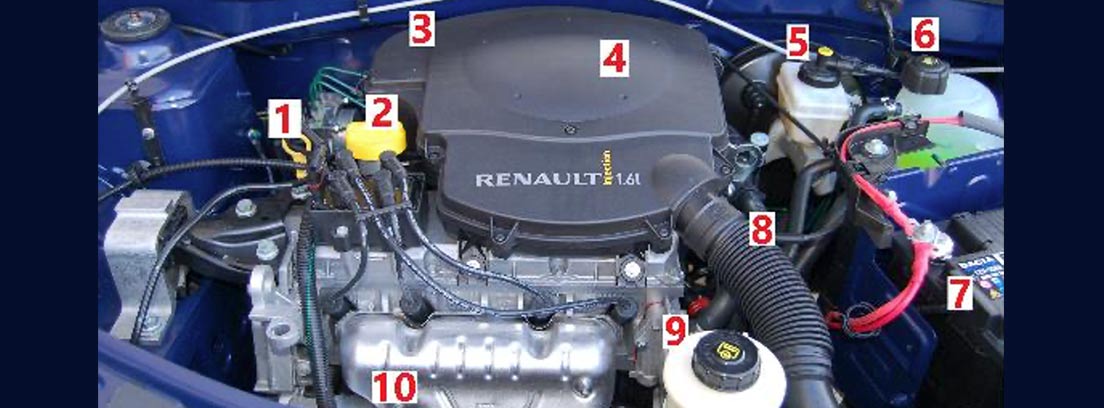However, today that experience has become somewhat obsolete, since most of today’s vehicles hide their parts under enormous black plastic covers, whose main function, apart from the mere aesthetic issue, is to serve as acoustic insulation.
However, you can still see the main parts of the car’s engine . Do you want to know them?

This engine, which corresponds to a Renault Dacia Logan , is made up of the following parts:
Oil stick
This dipstick allows us to know the amount of oil in the crankcase, a task that must be done every thousand kilometers, in a flat place and with the engine off and cold. To do this, you just have to unscrew it, take it out, clean it with a cloth, insert it again and take it out again. If the oil mark is between the maximum and minimum signs , it means that everything is correct.
oil tank
One of the relevant components in the engine system is the oil tank, since it is responsible for storing the lubricant that will circulate through the engine parts when it is in operation, thus avoiding friction between them.
If the dipstick reveals that there is little oil, you should refill the reservoir. It is important to do it little by little and check the levels and, above all, always add the same type of oil.
Injection system
The injection system is made up of a displacement pump that, thanks to pistons that are attached to each injector, injects the necessary fuel into the engine to carry out combustion.
Injector breakdowns are one of the most feared since their repair costs are very high. Therefore, it is important to pay attention to the symptoms of a malfunction.
Engine
The engine is the heart of the vehicle, responsible for converting the heat produced by combustion (in diesel) or by explosion (in gasoline) into movement powerful enough to rotate the wheels and move the car. It is usually covered with a black plastic coating.
Brake fluid reservoir
The brake fluid reservoir contains the appropriate amount of this fluid in the system, and its function is to enable the transmission of the force exerted on the brake pedal to the wheels of the car. Without it, serious problems can arise in the brake system, leading to very dangerous situations.
Therefore, it is important to always check their levels and that they are in good condition.
Coolant tank
This transparent tank contains the coolant or antifreeze liquid, whose function is to absorb the heat generated by the engine to prevent overheating and, at the same time, prevent the parts from freezing in winter.
It is usually green or pink. As with other liquids, you must ensure that it is always at the appropriate levels—in this case, between the maximum and minimum marks.
Battery
The battery is the element responsible for providing the electrical energy necessary to start the engine and for powering the electrical equipment when the vehicle is stopped.
Intake manifold
The intake manifold is a set of tubes through which air circulates to the cylinder head pipes. Hidden inside are the flow meter (responsible for measuring the mass of air entering the propeller) and the air filter.
This part provides jerk-free driving and adequate fuel consumption.
Hydraulic oil tank
The hydraulic steering system, thanks to which we do not have to use force to turn the steering wheel, is made up of a hydraulic circuit that is responsible for doing the hardest part of the job. One of its elements is this: the tank, where the hydraulic oil is stored, which, in its fresh state, has a raspberry color, and turns brown when it is old.
Alternator
In the front area of the engine is the alternator (not shown in the example image), a metal piece shaped like a wheel with copper cables inside, which is responsible for supplying electricity to the vehicle while driving and which, in turn, recharges and maintains the battery charge.
Leave a Reply